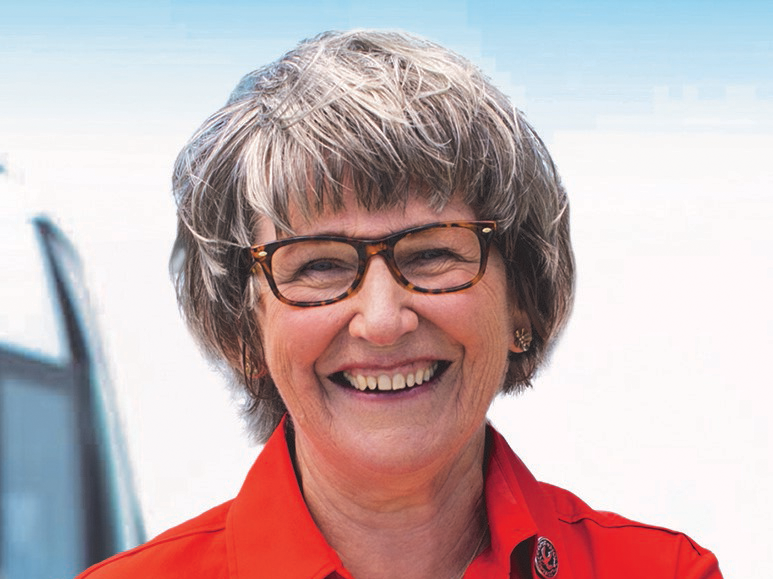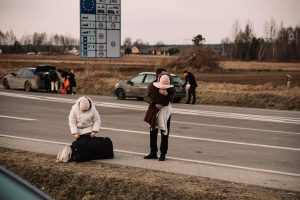Two weeks ago, Sister of Social Service Simone Campbell announced that she was stepping down from her post as executive director of NETWORK Lobby, a role she has held for the past 17 years.
In a press release, Campbell said, “I could not be more proud of what NETWORK has accomplished. From economic justice to immigration; peace building to expanding health care coverage; the environment to voting rights, NETWORK is doing the work needed to protect the most marginalized people among us. Our nation—and world—stand at the precipice of some of humanity’s greatest moral and ethical challenges. This election may be the most critical for our poorest, most vulnerable, and most marginalized sisters and brothers who will continue to struggle to survive a pandemic, live up to their full potential in the face of massive economic inequality, and overcome the obstacles presented by structural racism.”
The announcement that Campbell is stepping down comes shortly on the heels of the publication of her new book, Hunger for Hope: Prophetic Communities, Contemplation, and the Common Good (Orbis). In the book, she argues that the chaos of our time demands that every person of faith be open to listening to how God is calling them to work for justice in our broken world.
The U.S. Catholic editors sat down with Sister Simone to talk to her about what comes next for her, her new book, her reaction to Fratelli Tutti (On Fraternity and Social Friendship), and how all people of goodwill can work for justice in today’s political climate.
You recently announced your retirement from NETWORK after 17 years. Why right now?
Well, it’ll be 16 and a half years by the time March rolls around, but who’s counting. The way I’m saying it is that I’m stepping down as the executive director of NETWORK: The fact is, I’ll do something else. I don’t know what, but I’m sure that the Spirit will lead me on to some other form of mischief. It’s time for new leadership at NETWORK, and I’m ready for the next step.
Back in about 2015, I’d been at NETWORK for about 11 years, and it became clear to me that I should begin to think about leaving when the organization was in a strong position and was ready to deal with change.
I had thought in my own head that would be 2018: I thought that Secretary Clinton would be elected president, we’d have this transition, and NETWORK would be in this really great place for the 2020 presidential cycle. And then Donald Trump got elected president, and I could not walk away in the face of that chaos.
It became abundantly clear to me we needed tested leadership, leadership that was well-rooted in the political process and could navigate very challenging times. And so I delayed leaving another two years until I could say, “Okay, we’re strong: Now’s the time.”
What do you hope the legacy of your time at NETWORK will be?
So much has happened, and our organization has changed so much over the time I’ve been here. When I started at NETWORK in 2004, our members were still principally Catholic sisters. And while we were known on Capitol Hill, we were not known publicly across the media.
It became abundantly clear to me we needed tested leadership, leadership that was well-rooted in the political process and could navigate very challenging times.
My hope is that now we’re seen as a strong, faith-based Catholic advocacy group that works for all the economic justice issues of Catholic social teaching. Because of our beloved bus, the gift of the Spirit, we’re way more diverse than we were when I began this work. Our membership has grown dramatically, and we’re not just Catholics: We are people of faith. The way we describe ourselves is that we’re rooted in Catholic social teaching and open to all who share our passion.
That has been one of the big joys of my life: to see the explosion of interest and engagement in Catholic social teaching. Hopefully that continues beyond my tenure.
What is the biggest lesson you’ve learned during your time at NETWORK?
Right now what I’m thinking about is rooting advocacy in the stories of real people and how that has a power beyond the soundbite. Too often we fight politically with theories, and as Pope Francis says, “If we want to make peace, realities are more important than theories.” That’s why I think our Nuns on the Bus campaign has been so effective.
When you look at Fratelli Tutti (On Fraternity and Social Friendship)—which I have to say, I think of as an ice cream flavor as opposed to an encyclical—the story Pope Francis is telling is about the politics of encounter. It’s in encounter that we find a way forward: We share a common pain, we’re knit together in community, and from this understanding we can move forward as a nation or as a political entity.
We created a virtual Nuns on the Bus bus tour on our website where everybody could be a Nun on the Bus. It is all about trying to get people to engage in the bigger story of our nation and to learn something about a part of the country that’s not their own. It’s this ability to touch the real that I think really makes a difference in politics.
I know when I lobby people using real stories, politicians get nervous and they don’t want to talk about it. They just want to talk about the theories or the statistics, but the power is in the people.
The importance of telling personal stories is something that comes up in your new book, Hunger for Hope. Why is this so important?
I miss Paul Ryan being in Congress, because he and I would spar: Our first Nuns on the Bus trip was all about opposing his horrible budget. The first time I got to lobby him in person after the bus trip, he was impressing me with his intellect and knowledge of all numbers as chair of the Budget Committee.
It’s in encounter that we find a way forward: We share a common pain, we’re knit together in community, and from this understanding we can move forward as a nation or as a political entity.
Advertisement
But I told him about Billy and his wife, who I met at the St. Benedict the Moor’s dining room in Milwaukee, Wisconsin. Both worked full time, and they had to spend the majority of their wages on renting an apartment for them and their two boys. They didn’t really have enough money to buy food, so they used SNAP benefits to feed their boys during the day and went to St. Benedict the Moor at night.
One of Billy’s boys was 14 and the other was 7, a first grader. And the 14-year-old was voracious, one of those kids with just elbows and growth. And Billy said to me, “Parents, we can eat once, maybe twice a day, but growing kids, they can’t.”
Paul Ryan wanted to limit who could get SNAP benefits, which would have knocked Billy and his family out of the program. So I tell him their story, and his response was, “Well, you know, they’re not the targets of my program.”
“No,” I told him, “but they’re going to be your victims.” And he could not deal with it: He had to go back to numbers.
He also had a hard time whenever I showed compassion toward him as an individual. He told me once about something that always got him points on the campaign trail: He didn’t want to be tainted by Washington, D.C., so he kept his family in Janesville (as if they were in a box someplace) and he slept on a cot in his office.
So my response, trying to hold compassion for the people we lobby, was to ask, “Is that good for you or for your family? How do you really get a break when you’re here? I’m concerned: How do you do it?” But Ryan just changed the subject.
The thing that I realized is that when you touch the real and not the shell it changes things. It changes our relationship with one another. It shifts what can be cold policy and academic calculations to the reality of Billy and his wife and kids. That, to me, is the gospel reality of encounter.
In your book you write, “Unless we embrace the challenge of faithfulness in these chaotic times . . . I believe that we are lost.” How do you keep the faith? Where do you find God right now?
There are days I wonder, “Where the heck are you?” But my community is dedicated to the Holy Spirit. And there are two ways in which I experience the Spirit: One is in this encounter with others, and the other is during my morning meditation, when I experience the contemplative reality of just trying to be still and open and listen. I refer to it as deep listening to that wee small voice.
He also had a hard time whenever I showed compassion toward him as an individual.
On our virtual bus trip, over and over we met these amazing people who were signs of hope to me. There were the Angry Tias & Abuelas in McAllen, Texas, for example. These were women who volunteered because they were so worried about what the Trump Administration was doing with refugees and asylum seekers: just tossing them out on the streets of McAllen.
These women started showing up at the bus station, and they called their friends and said, “Hey, come, we need help.” They were just responding to the daily needs of these people. For me, that is a witness in hope: when people see a need and respond.
Or there’s a workers and immigrants’ rights group in New Jersey called New Labor that banded together to ensure their wages were paid after discovering. that some local businesses were intentionally stealing wages from immigrants because they know they won’t complain. That was shocking to me.
This group went into a local restaurant, which was withholding wages from employees, at 6 p.m. in the evening, when the restaurant was full of patrons, and raised the issue right there in the foyer. And, well, the patrons were interested. And so all of a sudden the employer said, “Oh, no, that was an oversight. That was a mistake. Let me take care of it now.”
That’s good news: people standing together because of need.
Can you speak a little more about how you see contemplation as a way forward?
That was the hardest part of my book to write, because contemplation is this ambiguous ethereal discipline of stillness.
There are two ways in which I experience the Spirit: One is in encounter with others, and the other is during my morning meditation, when I experience the contemplative reality of just trying to be still and open and listen.
Most days, I’m kind of antsy. I have to remind myself to take another deep breath and I often think, “What, it’s only been two minutes? Oh my God, that’s 23 minutes to go.”
But overall contemplation is trying to be present to the Divine. To choose over and over to open myself to the work of the Divine within me.
During a virtual retreat, I realized the benefits of being in the dark. I find these times really dark and challenging, and it’s hard to know the way forward. But in the dark, it’s easy to see the spark of the fire. For me, that is the sign of the Spirit.
I think we’re all called to be burning bushes. That’s the meaning of the flames on Pentecost over the apostles’ heads: They were all called to be a place where God flames up in their lives. And so are we.
And so the benefit of these challenging times is if we’re quiet, if we stay still for a minute and actually are willing to look into the dark, we will see the fire of the Spirit is there and be renewed. It’s hard, but it’s so worth it.
Do you have any advices for Catholics wanting to live out the politics of encounter that both you and Pope Francis talk about?
Our work at NETWORK integrates with Pope Francis’ call around economic justice. The structural inequality in our nation needs to be dramatically reformed. The structural racism that exists in our laws is critically important for Catholics, people of faith, people of no faith, and all people of goodwill to engage.
At NETWORK we’ve got a bunch of resources that are helpful in that, but it’s mostly about opening our hearts to the fact that we need change if people are to thrive and if we’re going to be able to carry out the gospel mandate: “Blessed are the poor in spirit. Blessed are those who mourn. Blessed are those who hunger and thirst for justice.”
I think one of the things that’s been so challenging is how some of our leadership has been captured by this rhetoric that Catholics are single-issue voters and only care about the criminalization of abortion. Pope Francis has made it so abundantly clear that this is not the case. NETWORK did a program called “Equally Sacred Priorities,” where we lifted up the breadth of what Pope Francis teaches are pro-life issues.
It worries me that by aligning with a single party, Catholics become disconnected from the gospel experience of Jesus encountering those in need.
It worries me that by aligning with a single party, Catholics become disconnected from the gospel experience of Jesus encountering those in need. And that’s what Pope Francis talks about: walking towards those in need. I love the way he breaks open the story of the Good Samaritan in Fratelli Tutti. He talks about the importance of the innkeeper in the story, and how we need structures to respond to the needs of those around us.
My ministry has been working to support those structures, and I felt so seen and affirmed by Fratelli Tutti. But I think so many of our people don’t see that broader need or the broader truth in that. We’re crippling our nation by not having the fullness of our faith available.
How can Christians stay motivated to act for justice and open to how the Spirit is moving in their lives?
I love the scriptural image that we are all one body. That is a contemplative truth: to know that we’re all connected, all one, and to do my part.
But the thing that’s required is to listen and respond to need. That requires two things: One is to stop long enough to listen, to be quiet, to be still. I call it a contemplative stance.
I hope the word contemplative doesn’t scare people; it’s just being quiet before God and letting God rise up in us. God’s there. My experience is that God creates us, hums us into being at every moment. And so God’s present; I just need to pay attention.
The second step is acting on what you hear. But acting doesn’t mean doing something because my friend is doing it or getting everybody else to do it my way or not doing something because nobody else is doing it. We each have a unique role to play.
It may be frustrating that we do not know immediately who won our 2020 presidential election. Nonetheless, democracy is worth the hard work and the wait.
It came to me in prayer one day that my role is to be stomach acid in the body of Christ. Right now what I do is I go around and release energy. I stir people up. I help people digest what’s happening in their lives and that liberates energy. But if they don’t pick up the energy and use it, then I can become toxic to them. And that’s not good.
Seeing our part is really important, knowing the presence of the divine in our lives and then acting on what we hear. As is doing it without fear. “Fear not,” Jesus said. “Fear not.”
Do you have any advice for people who might be feeling discouraged after last night’s election?
In a secular democracy, voting is the closest thing we have to a sacrament, and we will do everything we can to protect this sacrament. Over 500 Catholic sisters and their allies in Michigan, Wisconsin, and Pennsylvania have made it clear to their secretaries of state that vote counting is a moral obligation. It doesn’t matter how long it takes: A full count is the only way to achieve a valid result for our nation.
It may be frustrating that we do not know immediately who won our 2020 presidential election. Nonetheless, democracy is worth the hard work and the wait. We must insist that our democracy can and does work. We will give the vote counting the time needed to ensure that we accurately count every vote.
The United States has weathered political uncertainty before, and we are confident in our nation’s ability to endure this brief period of waiting. Our democracy is strong enough to insist that every vote be counted. And we the people are committed enough to wait.
Image: Courtesy of Simone Campbell














Add comment